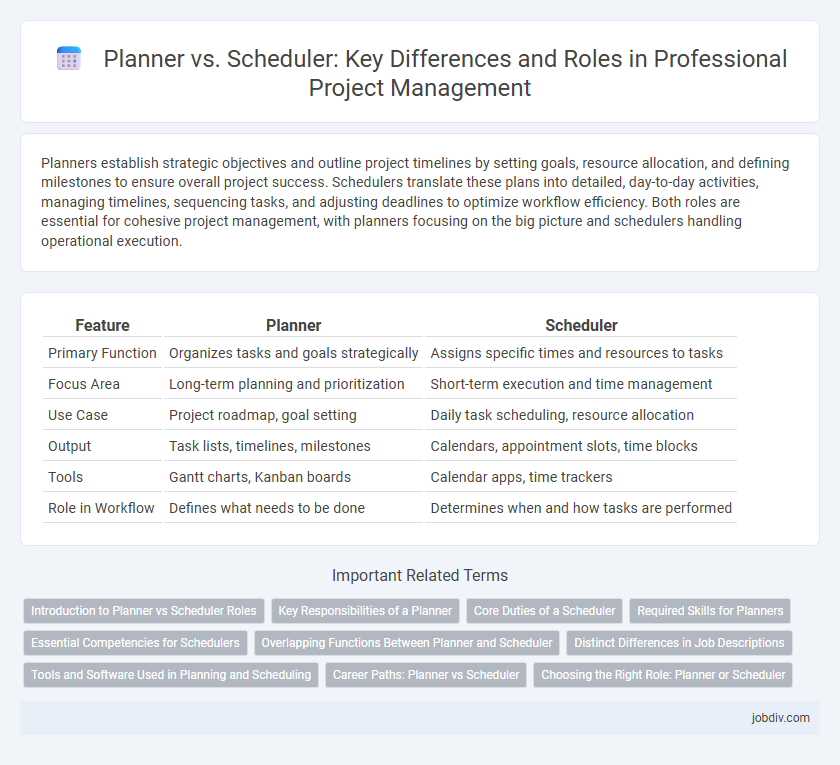Planners establish strategic objectives and outline project timelines by setting goals, resource allocation, and defining milestones to ensure overall project success. Schedulers translate these plans into detailed, day-to-day activities, managing timelines, sequencing tasks, and adjusting deadlines to optimize workflow efficiency. Both roles are essential for cohesive project management, with planners focusing on the big picture and schedulers handling operational execution.
Table of Comparison
| Feature | Planner | Scheduler |
|---|---|---|
| Primary Function | Organizes tasks and goals strategically | Assigns specific times and resources to tasks |
| Focus Area | Long-term planning and prioritization | Short-term execution and time management |
| Use Case | Project roadmap, goal setting | Daily task scheduling, resource allocation |
| Output | Task lists, timelines, milestones | Calendars, appointment slots, time blocks |
| Tools | Gantt charts, Kanban boards | Calendar apps, time trackers |
| Role in Workflow | Defines what needs to be done | Determines when and how tasks are performed |
Introduction to Planner vs Scheduler Roles
Planners develop comprehensive project roadmaps by defining objectives, allocating resources, and setting timelines to guide overall project execution. Schedulers focus on detailed task sequencing, timeline adjustments, and progress tracking to ensure that daily activities align with the project plan. Both roles are essential for synchronizing strategic goals with operational workflows, optimizing project efficiency and delivery.
Key Responsibilities of a Planner
A Planner is responsible for developing detailed project plans, establishing timelines, and allocating resources to ensure project objectives are met efficiently. They analyze project risks, coordinate with stakeholders to align schedules with business goals, and monitor progress to adjust plans as needed. Effective communication and strategic foresight are essential for a Planner to optimize workflow and enhance project delivery outcomes.
Core Duties of a Scheduler
A scheduler is responsible for organizing and allocating resources, establishing timelines, and ensuring tasks are completed within set deadlines to optimize workflow efficiency. Unlike planners who focus on strategic forecasting, schedulers concentrate on day-to-day operational coordination, adjusting schedules in response to real-time changes and resource availability. Their core duties include managing calendars, coordinating team activities, and monitoring progress to prevent bottlenecks and maintain project continuity.
Required Skills for Planners
Planners require strong analytical skills to assess project scope, resources, and timelines effectively. Expertise in risk management and proficiency with planning software like Microsoft Project or Primavera are essential to develop realistic and adaptive plans. Excellent communication skills enable planners to coordinate with stakeholders and ensure alignment on objectives and deliverables.
Essential Competencies for Schedulers
Schedulers require expertise in time management, project coordination, and resource allocation to optimize workflows and meet deadlines efficiently. Proficiency in software tools such as Microsoft Project, Primavera, or scheduling-specific ERP modules enhances the ability to create accurate timelines and adjust plans in real-time. Strong analytical skills and attention to detail are essential for identifying potential delays and ensuring seamless communication between cross-functional teams.
Overlapping Functions Between Planner and Scheduler
Planners and schedulers share overlapping functions such as resource allocation, timeline development, and task prioritization to ensure project efficiency. Both roles coordinate with various stakeholders to align project goals and deadlines while adjusting plans to mitigate risks. Effective collaboration between planners and schedulers enhances workflow synchronization and optimizes project delivery outcomes.
Distinct Differences in Job Descriptions
Planners focus on strategic forecasting, resource allocation, and long-term capacity planning to optimize organizational goals. Schedulers handle the detailed timing of tasks, coordinating workforce shifts, production sequences, and deadlines to ensure workflow efficiency. The planner's role emphasizes high-level analysis and decision-making, whereas the scheduler operates with day-to-day execution and operational control.
Tools and Software Used in Planning and Scheduling
Planners typically use tools like Microsoft Project and Primavera P6 to develop comprehensive project timelines and allocate resources efficiently. Schedulers rely on software such as Asta Powerproject and Oracle Primavera for detailed task sequencing and real-time schedule adjustments. Integration of these tools improves workflow coordination and enhances project delivery accuracy.
Career Paths: Planner vs Scheduler
Career paths in planning and scheduling diverge based on skill sets and industry demands; planners often focus on strategic decision-making, resource allocation, and project forecasting, leading to roles in project management or operations management. Schedulers specialize in timeline development, task sequencing, and real-time adjustments, making them essential in construction, manufacturing, and event coordination. Advancement in planning typically involves broader organizational impact, while scheduling careers emphasize technical precision and process optimization.
Choosing the Right Role: Planner or Scheduler
Selecting the right role between planner and scheduler depends on organizational needs and project complexity. Planners focus on long-term strategy and resource allocation, while schedulers concentrate on detailed timelines and task sequencing. Effective project management often requires integrating both roles to optimize workflow and meet deadlines efficiently.
Planner vs Scheduler Infographic

 jobdiv.com
jobdiv.com